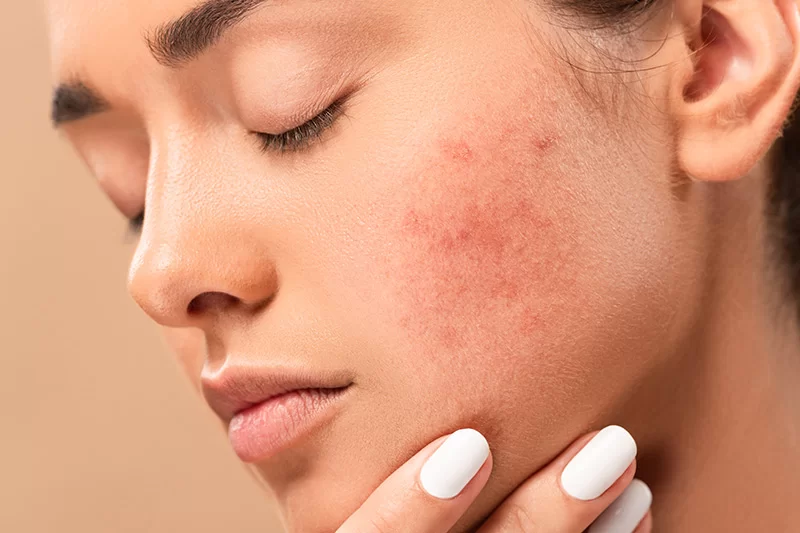Eczema (Dermatitis):
The term eczema refers to various forms of skin swelling and rash, also known as dermatitis. Eczema is not contagious, so individuals with eczema should be treated normally, such as through greetings and physical contact. Most types of eczema cause itching, and when scratched or touched, the skin becomes irritated and turns red. Eczema appears on the face, inside the elbows, on the hands, and feet. The most common type of eczema is atopic dermatitis. Most types of eczema affect children but can also affect adults. Moderate to severe eczema in infants puts them at risk for peanut allergies, asthma, and hay fever.
Atopic dermatitis is a chronic condition that often appears in infants and continues into childhood.
Symptoms of eczema and atopic dermatitis:
1- Eczema and atopic dermatitis appear as dry, itchy skin. Scratching the skin causes it to become red and severely irritated, worsening the condition. Fluid may also leak from the skin, and eventually, the skin may flake off. Areas most prone to eczema include elbow creases, behind the knees, cheeks, and buttocks.
2- Risk factors for eczema: The exact cause of eczema is not entirely clear; genetic and environmental factors may play a role in its development. If a family member has eczema, your likelihood of developing it increases. Eczema is not contagious, so your condition cannot be passed on from an infected person.
3- Diagnosis: Eczema is usually diagnosed through a general physical examination and medical history. It is important to inform your doctor if you have any allergies or asthma. Your doctor may request skin allergy tests and other blood tests to rule out other causes.
4- Can you avoid eczema: Since the exact causes of eczema are not completely known, they cannot be entirely avoided. However, by identifying the triggers that cause this sensitivity and avoiding them, you can manage the condition. It is important to identify your relationship with these triggers, such as household cleaners, soaps, certain cosmetics, post-shave products, and more. Try to use unscented soap and dry your hands thoroughly after washing to prevent skin irritation caused by moisture. Wear gloves (vinyl or plastic) when dealing with a lot of water, and to prevent sweat accumulation on your hands, consider wearing cotton gloves under plastic gloves to absorb sweat and reduce moisture as much as possible.
5- During winter and to avoid eczema triggers, protect your hands from dry and humid air. Make sure your clothes are made of cotton, as woolen clothing may irritate the skin.
6- During bathing, it is preferable to use chemical-free and unscented products as much as possible, which can be found in baby soap and some medical soaps. It is best to maintain moderate water temperature, not too cold or too hot. Try to bathe in a bathtub for 15-20 minutes to moisturize the skin, use a soft towel without rubbing the skin, and after bathing, it is recommended to use moisturizers that retain skin moisture.
7- Constantly moisturizing the skin to prevent skin cracking is essential. It is preferable to use fragrance-free and chemical-free moisturizers. Vaseline is the best moisturizer for such conditions. Ointment moisturizers are better than creams because they usually contain more preservatives.
8- Avoid activities that cause excessive sweating as they can trigger eczema and skin inflammation. Avoid scratching the skin, as it can cause skin scratching, bacterial entry, and worsening of the condition. Moisturizing will help prevent itching.
Symptoms of eczema and atopic dermatitis:
Most medical treatments aim to reduce skin irritation and itching. It is best to consult a doctor to determine the appropriate medications based on the degree of skin irritation you have:
1- Corticosteroid creams and ointments are recommended by doctors to be applied directly to the skin after cleaning it. This will alleviate your pain and itching. Use it as prescribed by your doctor, and if you do not feel improvement with repeated use, inform your doctor.
2- Antihistamines reduce skin sensitivity and irritation.
3- There is a new class of medications known as immunomodulators that work to inhibit the body's exaggerated immune response towards allergens, thereby significantly reducing itching and irritation. The FDA recommends using these medications after trying other solutions, so consult your doctor before starting these types of medications.
Finally, living with eczema (dermatitis) is important for controlling it. By following these instructions and taking the prescribed medications from your doctor, you can significantly reduce these symptoms, especially since eczema is a chronic condition that may improve or worsen over time..

